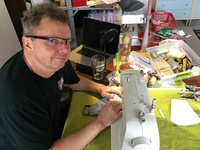 |
| Angelika/Mike Schilli |
|
Angelika Anyone who has known me for a long time knows that I am not exactly an enthusiastic sports fanatic. In school, I always had the worst grades in physical education, which didn't really bother me because I preferred being good in English and bad in sports rather than the other way around! However, I often suffered a lot in gym class and had many rather clueless gym teachers who didn't understand why it made me shudder and scared to jump over a vaulting horse. Nowadays, I enjoy being active, especially outdoors: hiking, swimming in the ocean, biking, boogie boarding in Hawaii; I'm in. There is a widespread belief that the USA is only made up of overweight people who lounge around on the couch, shoveling potato chips and popcorn into themselves. Of course, as always, this is a bit of an oversimplification. For many Americans, exercise and sports are also important.
And of course, there are also those who overdo it and spend the entire day figuring out how to optimize their bodies. A visit to the beach in Los Angeles reveals many such specimen who not only constantly train their muscles but also feel the need to show off their well-toned bodies, whether their fellow humans want to see it or not. I am generally suspicious of anything that comes across as extreme: extreme political views as well as health fanatics. My motto is more: everything in moderation. So far, I have had the impression that San Franciscans like to be outdoors but are not completely crazy when it comes to physical exercise. However, the coronavirus crisis has unfortunately led to another epidemic in San Francisco. Since yoga and fitness studios are closed, joggers are now clogging the streets, just like cars used to.
Based on my observations, joggers can be divided into three categories: those who have always enjoyed jogging, those who have never run in their lives and have now started jogging during the crisis —- usually noticeable by their completely exhausted, red-faced appearance as they trot by, making you fear they might collapse at any moment—and then those who can't live without jogging and sprint through the landscape like maniacs, without any regard for others.
I'm currently not very fond of the latter category. As is well known, people don't have eyes in the back of their heads, which also applies to pedestrians on sidewalks. Some of these joggers, who sprint around at breakneck speed in a straight line, seem to have forgotten this important fact. It has happened to me several times that these joggers came so close to me that I could feel their breath on my back before they rushed past me, even though there was plenty of space to move aside. Apparently, it is too much to ask for them to deviate from their straight line and run a bit of a slalom. I couldn't even protest loudly, because this type of jogger usually has earplugs in, listening to music while running.
Now, to be honest, I don't really know what danger of infection these joggers pose. I think what bothers me more is the inconsiderateness of some people, but that was already the case before the coronavirus crisis. Fortunately, the majority of people we encounter on our daily walks keep their distance, or they step aside, or sometimes even say thank you when we make room for them. Michael is more relaxed about it than I am anyway. My theory is that in the current crisis, people's personal risk tolerance greatly influences their behavior.
Lately, I keep thinking about a fascinating lecture in the field of psychology at the castle in Münster from the time before my special education studies. The fact that I still remember the content of the lecture after decades is astonishing and shows how interesting I found the material. Professor Ulrich Tränkle, a leading traffic psychologist, explained to us the psychology of risk perception and how it affects decision-making. People do not necessarily assess risks objectively, but subjectively, and this subjective perception often leads to poor decisions. I wonder what the good Mr. Tränkle would say about the current coronavirus measures? Unfortunately, he passed away in 1995 and can no longer contribute to the discussion.
Best regards from Saint Frankstadt!
Angelika and Michael













